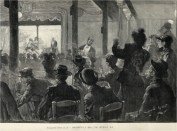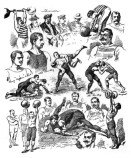Belgium
& Greco-Roman Wrestling |
Part 2 |
| Continued from Belgium Traditional Wrestling & Greco-Roman Wrestling -PART 1 | ||
| Public interest in wrestling in Paris had gone through waves of enthusiasm since the end of the Napoleonic wars but by the beginning of 1898 another temporary hiatus had taken place and the sport had gone down market again. A number of small theatres and cafés in Paris were holding regular wrestling contests but the most important of these lesser establishments was, “la salle Gangloff…..On désigne ainsi un café-concert, situé rue de la Gaité à Montparnasse.” (La Salle Gangloff….One points out a café-concert, situated on the Rue de la Gaité, in Montparnasse) (Remy Saint-Maurice) | ||
| The majority of the clièntele were prosperous horse and grain merchants of the district, particularly l’Avenue du Maine. In 1897 the manager, Horace Delattre organised “des soirées athletique chaque Mercredi.” (athletic evenings every Wednesday), these were an immediate success and Saint-Maurice wrote “C’est dans les milieux populaires qu’on voit le mieux combien ce sport tient au cœur des masses.” (In this popular atmosphere one can see better how the sport remained in the heart of the masses.) | ||
| Into this feverish atmosphere stepped the new sensation Constant Le Boucher (Lavaux) who had already pinned Félix Bernard and wrestled a draw with Paul Pons. He was engaged by Delattre and in his first night in the theatre pinned all of his opponents. The newspapers became obsessed with him; he seemed invincible and M. De Lucenski, the very enterprising Director of the newspaper, “Journal Des Sports” came to the Salle Gangloff to see what was happening. He saw the astonishing affluence of the spectators who were so passionately attracted to the wrestling and thought of how to take this sport to all of Paris. | ||
| The prospect of a World Championship was now in the air as a practical project. Paul Pons and Wladislaus Pytlasinski (1863/1938?) of Poland had wrestled a draw in Russia, Gambier and Sabés of Bordeaux, the Austrian Wetasa and above all the new sensation Constant Le Boucher were all in Paris. De Lucenski put the proposal to the Directors of the Casino de Paris, MM. Borney and Després who enthusiastically agreed to the project. At last the sport first developed among the chicanery always present in the circus or fairgrounds of Europe was to be properly marketed and presented to the world stage. | ||
| In 1896 the amateur Olympic competition in Athens had attracted only five competitors of a poor standard from four countries, all the best wrestlers were professional. Then a first World Championship tournament had been held in Brussels in 1897, and in August 1898 a very successful European Championship tournament had been held in Vienna as part of the Golden Jubilee celebrations of the Austro-Hungarian Emperor Franz-Joseph I. Now the pick of the European strongmen, the celebrities of circus and theatre would compete for the Championship of the World, which was to be backed by a major sporting journal. Greco-Roman wrestling was about to reach the zenith of its career and until the First World War began it was the major sporting and entertainment interest in every European city. | ||
| The championship was held in November 1898; there were thirty competitors and eventually Paul Pons and Pytlasinski met in the final. After being caught in a vigorous Head-in-chancery or headlock “une cravate un peu brusque” Pytlasinski complained of spitting blood and conceded defeat (which seems at this distance to be a trivial reason for a tough professional to withdraw when there is a lot of money at stake.) Maurice Gambier placed third, Watesa placed fourth and the newspapers stated that never before had such crowds been seen in the Rue de Clichy. | ||
| The magazine, Le Vélo immediately organised another tournament, “Le Grand Prix de la Ville de Paris” in the Folies-Bergère. Constant le Boucher and Fernand Sabés of Bordeaux, who had withdrawn from the championship entered. Pytlasinski, Laurent le Beaucairois, Aimable de la Calmette, the newly arrived Turks, Cour Derreli or more correctly, Kurt Derelli Mehmet Pehlivan (1864/1939) and Kartanji plus many lesser lights joined them. Pytlasinski won the first prize of 3,000 Francs and Constant le Boucher placed second. These tournaments were not like modern events, which last two or three days and in all there had been two months of continuous high level wrestling in Paris. | ||
| In the 1899 World Championship also in Paris, Constant le Boucher placed third behind Kara Ahmed (1870/1902) of Turkey and Laurent le Beaucairois (born 1867) of France. He was lighter than many of his opponents in the open or heavyweight categories and in the 1900 World Championship he won the ‘Poids legers’ (lightweight) category and placed second in the heavyweight championship to Laurent le Beaucairois. | ||
| Continued on Belgium Traditional Wrestling & Greco-Roman Wrestling -PART 3 | ||
|
|
| © Copyright 2000 - 2009 Scottish
Wrestling Bond © Website Designed &
Maintained By: Davie McGinn |





